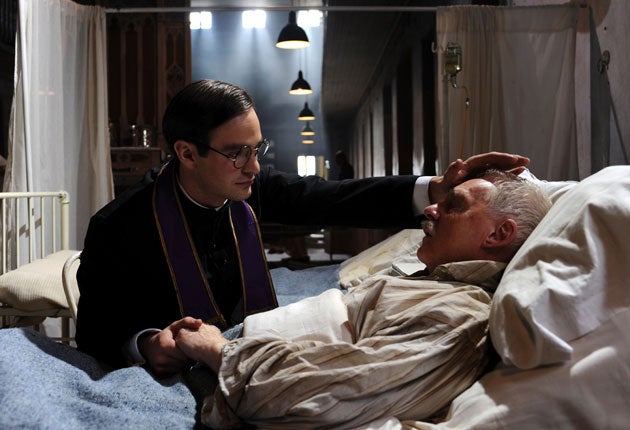Coming soon. Opus Dei: The movie
Secretive Catholic organisation pumps money into £25m biopic to counter Dan Brown's bad publicity

Nearly a decade after Dan Brown's novel The Da Vinci Code propelled it to global notoriety, the secretive Catholic organisation Opus Dei is hitting back with a new movie that seeks to show its controversial founder, Josemaria Escriva, in a glowing light.
The film, There Be Dragons, premiered in Madrid this week; it opens in the US in May, and is expected to come to UK screens in the autumn. Funded largely by money from Opus Dei donors, it's directed by the veteran Hollywood film-maker Roland Joffe, whose previous blockbusters include The Mission (the story of Jesuit priests in South America) and The Killing Fields.
It is peppered with British film talent, including Charles Dance and Derek Jacobi, and in the lead role is the up-and-coming British actor Charlie Cox, who has just landed a part in the US hit series Boardwalk Empire. Other big names include Wes Bentley, whose credits include American Beauty, and Geraldine Chaplin.
There Be Dragons cost around $40m (£25m) to make, much of which came from Opus Dei members and sympathisers who were keen, in the wake of what was seen as disastrous PR fallout from The Da Vinci Code, to put their side of the story in a big-screen movie. The film's backers are making much of the fact that Joffe is an agnostic Jew, but they admit that Opus Dei members had input into the film, and Opus Dei fielded one of its own priests, Fr John Wauck, as on-set adviser.
The film centres on the early life of Escriva, the Spaniard who founded Opus Dei and was canonised by Pope John Paul II in 2002.
Escriva has been criticised for colluding with the fascist General Franco, but the film portrays him as apolitical and determined not to take sides. In one scene, he is shown practising self-flagellation, one of the more controversial Opus Dei practices.
Speaking in Madrid this week, Joffe said he had initially turned down the job of directing the film, but he reconsidered after seeing film footage of Escriva telling a girl who wanted to convert from Judaism to Catholicism that she shouldn't do it, because it would be disrespectful to her parents. He said he was open-minded about Opus Dei when he took the project on. "What I discovered is that there's no such single thing as Opus Dei; there are individuals who come together, and that's what they call themselves," he said.
Cox, who was raised a Catholic although he is not a regular churchgoer, said he was taken on an Opus Dei retreat and spent time visiting Opus Dei houses in preparation for his role. "Before I got the part, I'd never heard of Josemaria and all I knew about Opus Dei was what was in Dan Brown's book," he said. "When I told my friends what I was doing, a lot of them said I should be very careful, and many people's response was one of fear. But no one had any real evidence to back up that reaction."
Critics of the organisation say its adherents are too closely wedded to Vatican edicts and refuse to use their own judgement.

Watch Apple TV+ free for 7 days
New subscribers only. £8.99/mo. after free trial. Plan auto-renews until cancelled

Watch Apple TV+ free for 7 days
New subscribers only. £8.99/mo. after free trial. Plan auto-renews until cancelled
There's also a sense of elitism around the movement, which "invites" new recruits, focusing on top universities to expand its membership. Women are banned from its male houses, but are allowed to enter to clean and to cook for the men.
The US Catholic commentator John Allen, who wrote a book on Opus Dei six years ago, has called the new film "a sort of anti-Da Vinci Code" and says it "makes the group seem as heroic and sympathetic as Dan Brown's potboiler, and subsequent film, made it appear weird and menacing".
Elena Curti, deputy editor of the Catholic weekly The Tablet, said: "Brown's portrayal was ridiculous, with the mad albino monk and all the strange goings-on. Because of Brown, Opus Dei has been given all sorts of opportunities to set the record straight – as it would see it – and this film is in its way the latest of those chances."
Join our commenting forum
Join thought-provoking conversations, follow other Independent readers and see their replies
0Comments